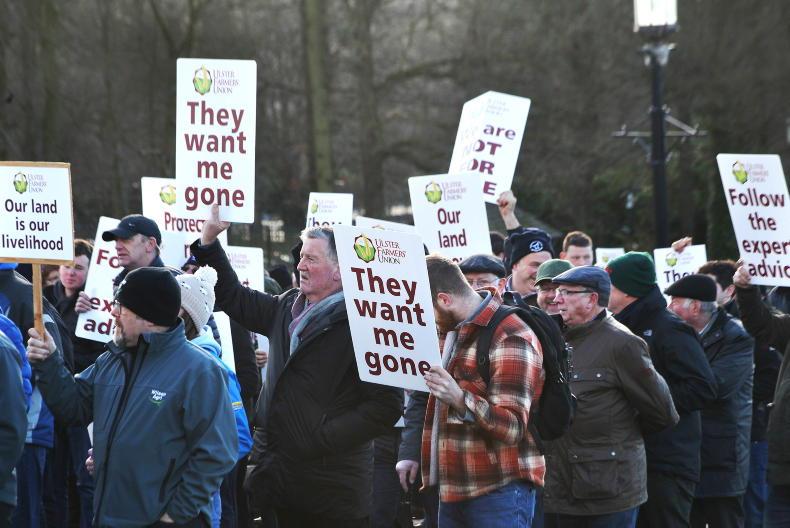There remains much uncertainty regarding what will happen with proposed climate change legislation in the weeks ahead.
Over the last 10 days there has been a raft of amendments made to the Stormont Executive’s climate bill taken forward by Agriculture Minister Edwin Poots.
Chief among those was the headline target, now amended to a requirement that NI achieves net zero greenhouse gas emissions by 2050, not a reduction of at least 82% by that date.
Some are well aware of the legitimate concerns expressed by farm organisations. Some probably don’t care
Despite intensive lobbying by the agri-food sector, a majority of politicians forged ahead.
Some are well aware of the legitimate concerns expressed by farm organisations. Some probably don’t care. But in nearly all cases, if the party leadership tell them to vote a certain way, that is what they will do.
In the coming weeks there is still the potential to get a new amendment passed that takes into account the concerns of farmers.
Or Minister Poots could decide to withdraw the bill, meaning it all starts again from scratch post a May Stormont election.
If the other bill is withdrawn, this Bailey bill could make a swift return following an election
There is also the private members’ bill from Clare Bailey waiting in the wings, with an even more challenging target of net zero by 2045.
While it now looks very unlikely it will make it through the legislative process in the current Stormont mandate, if the other bill is withdrawn, this Bailey bill could make a swift return following an election, and that would be an even worse outcome for farmers.
Unfortunate
Either way, it is highly unfortunate that the vote last Tuesday for or against a net zero target was largely split along orange and green lines, because this issue is far bigger than narrow Irish politics.
Fundamentally, it is about where in the world we should be producing food.
The island of Ireland is very well suited to grass-based and sustainable livestock production.
Scaling the industry back over the next 30 years to being little more than a cottage industry will mean we import more food, with a higher carbon footprint, from further afield.
As farmers we shouldn’t give up on letting our views be known.
Read more
Measures to reduce dairy emissions ‘must be voluntary’ – Boyle
MLAs vote for NI livestock wipeout
There remains much uncertainty regarding what will happen with proposed climate change legislation in the weeks ahead.
Over the last 10 days there has been a raft of amendments made to the Stormont Executive’s climate bill taken forward by Agriculture Minister Edwin Poots.
Chief among those was the headline target, now amended to a requirement that NI achieves net zero greenhouse gas emissions by 2050, not a reduction of at least 82% by that date.
Some are well aware of the legitimate concerns expressed by farm organisations. Some probably don’t care
Despite intensive lobbying by the agri-food sector, a majority of politicians forged ahead.
Some are well aware of the legitimate concerns expressed by farm organisations. Some probably don’t care. But in nearly all cases, if the party leadership tell them to vote a certain way, that is what they will do.
In the coming weeks there is still the potential to get a new amendment passed that takes into account the concerns of farmers.
Or Minister Poots could decide to withdraw the bill, meaning it all starts again from scratch post a May Stormont election.
If the other bill is withdrawn, this Bailey bill could make a swift return following an election
There is also the private members’ bill from Clare Bailey waiting in the wings, with an even more challenging target of net zero by 2045.
While it now looks very unlikely it will make it through the legislative process in the current Stormont mandate, if the other bill is withdrawn, this Bailey bill could make a swift return following an election, and that would be an even worse outcome for farmers.
Unfortunate
Either way, it is highly unfortunate that the vote last Tuesday for or against a net zero target was largely split along orange and green lines, because this issue is far bigger than narrow Irish politics.
Fundamentally, it is about where in the world we should be producing food.
The island of Ireland is very well suited to grass-based and sustainable livestock production.
Scaling the industry back over the next 30 years to being little more than a cottage industry will mean we import more food, with a higher carbon footprint, from further afield.
As farmers we shouldn’t give up on letting our views be known.
Read more
Measures to reduce dairy emissions ‘must be voluntary’ – Boyle
MLAs vote for NI livestock wipeout










SHARING OPTIONS